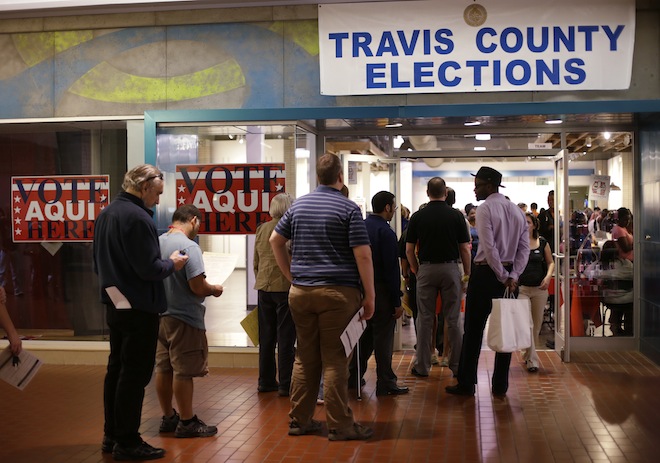Texas Republicans were caught red-handed in 2011 trying to establish voting laws with the intent to discriminate against certain minority groups — a fact that could come back to haunt them as civil rights activists push to limit the state’s newly granted freedom to change voting laws without federal approval.
The Supreme Court recently struck down the formula that determines which jurisdictions must win federal preclearance before to changing their voting laws. Texas was one of them. But civil rights advocates are pushing to place Texas back on the preclearance list, using a lesser-known provision of the Voting Rights Act that allows courts to “bail in” jurisdictions that deliberately try to discriminate against certain ethnic groups.
Here’s why they believe they have a strong case.
In 2011, Texas Republicans put forth a redistricting plan that a federal court in Washington, D.C., concluded was intentionally designed to dilute the strength of African-American and Hispanic votes. Purposeful — not merely incidental — discrimination. As a result, it was blocked under the now-neutered Section 5 of the Voting Rights Act. A series of highly revealing emails between Republicans about the redistricting process, which included redrawn maps for state legislative districts as well as congressional districts, were unearthed in the ensuing litigation and proved fatal to their case.
In one email, a lawyer for Rep. Lamar Smith (R-TX) said that the Republican wanted to move a white neighborhood near the San Antonio Country Club from a Hispanic congressional district into his own congressional district, in order to make the Democratic-leaning district less white.
In response, a Republican staffer for Rep. Joe Barton (R-TX) warned in a private email that the gerrymandered map “has next to no chance of pre-clearance.”
At the time, Republican state Rep. Beverly Woolley, a leader of the redistricting efforts in Harris County, told a group of minority representatives, “[Y]ou all are protected by the Voting Rights Act and we are not. … We don’t want to lose these people due to population growth in the county, or we won’t have any districts left.”
In a separate instance, one Republican congressman told another that he needed “more Mexicans in [his] district” but not from areas where Latinos were politically active.
The Justice Department argued at the time that the emails left little doubt that “racial as well as political data were most accurately driving the line drawing.”
The evidence was enough for a three-judge panel on the D.C. court to deny pre-clearance and conclude that the new map was drawn with “discriminatory purposes.” The court said the new district lines removed the “economic guts” from African-American districts but performed “no such surgery” on regions represented by white lawmakers.
“Anglo district boundaries were redrawn to include particular country clubs and, in one case, the school belonging to the incumbent’s grandchildren,” wrote Judge Thomas Griffith for the court. “The only explanation Texas offers for this pattern is ‘coincidence.’ But if this was coincidence, it was a striking one indeed.”
Texas State Rep. Trey Martinez Fischer (D), a leading figure in the pushback against Republican gerrymandering, said in an interview last week with TPM that the evidence left no doubt that the GOP engaged in a systematic, “sophisticated” effort to alienate minority voters in 2011.
“Those emails show very clearly they were drawing districts based on race,” Fischer told TPM. “They’d go all the way down to a precinct or city block level. … It was an effort to microtarget voters on the basis of how they vote and who they vote for.”
As a result, the court threw out the 2011 district maps and drew its own for Texas to use in the 2012 elections. Not happy with the new map, Texas Republicans took another stab this year at drawing its own district maps, which brings us back to the present legal battles.
Two current lawsuits are pending against Texas. One challenges the state’s proposed 2013 redistricting map, which civil rights advocates also say discriminates against minority groups.
A second, more recent lawsuit seeks to place Texas back on the list of jurisdictions that require pre-clearance. The plaintiffs invoke Section 3 of the Voting Rights Act, which allows for jurisdictions to be “bailed in” to the pre-clearance requirement if they are found to deliberately discriminate against minority groups. Civil rights advocates are submitting evidence from 2011 as the basis to immediately require Texas to pre-clear voting changes with the Justice Department or a federal court despite the Supreme Court decision.
The state of Texas has asked that the court cases against its proposed 2013 redistricting map be dismissed in the wake of the Supreme Court ruling on the Voting Rights Act. Texas Republicans argue that pre-clearance is a violation of states rights.
Martinez is now involved in the legal effort to place Texas back under pre-clearance.
“Given the record established in Texas, proven intent is not going to be difficult,” he said. “There are so many smoking guns, so many admissions. … This is probably the worst type of discrimination. This is when a mindset of discrimination meets the 21st century.”






